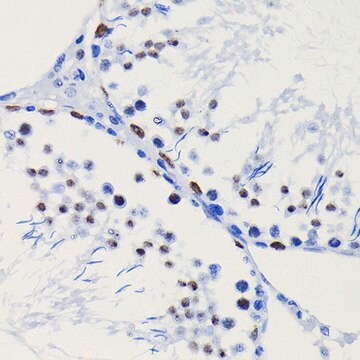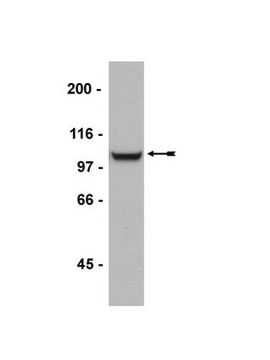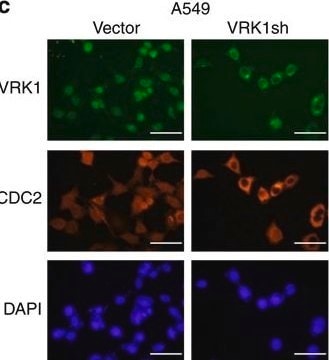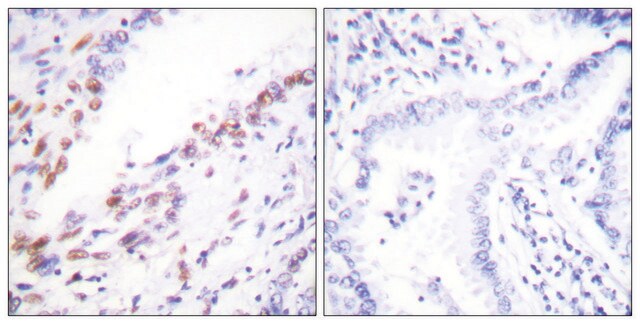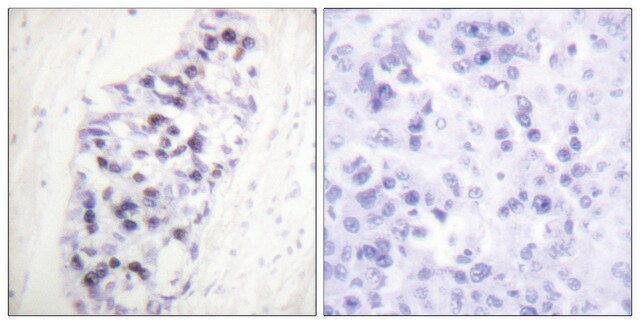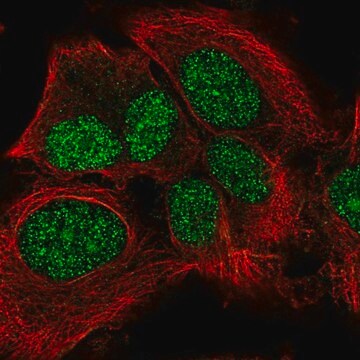추천 제품
생물학적 소스
rabbit
Quality Level
결합
unconjugated
항체 형태
IgG fraction of antiserum
항체 생산 유형
primary antibodies
클론
polyclonal
형태
buffered aqueous solution
분자량
55 kDa
종 반응성
dog, bovine, human, guinea pig, rat, mouse
농도
0.5 mg - 1 mg/mL
기술
western blot: suitable
NCBI 수납 번호
UniProt 수납 번호
배송 상태
wet ice
저장 온도
−20°C
타겟 번역 후 변형
unmodified
유전자 정보
human ... HDAC1(3065)
일반 설명
Histone deacetylase 1 (HDAC1) is involved in the regulation of eukaryotic gene expression. HDAC1 is involved in the regulation of critical cell processes such as cell proliferation, differentiation and apoptosis. HDAC1 in association with other gene regulatory proteins regulates a wide range of specific gene cascades. For example HDAC1 is a regulator of retrotransposon expression in mouse embryonic stem cells. HDAC1 is the target of various histone deacetylase inhibitor under development as potential cancer therapeutic agent.
특이성
Anti-HDAC1 polyclonal antibody reacts with canine, human, mouse, rat, and bovine histone deacetylase 1 proteins.
면역원
Synthetic peptide directed towards the C terminal region of human HDAC1
애플리케이션
Anti-HDAC1 polyclonal antibody is used to tag histone deacetylase 1 protein for detection and quantitation by Western blotting and in plasma by immunohistochemical (IHC) techniques. It is used as a probe to determine the roles of histone deacetylase 1 in a variety of gene activation cascades and cellular processes.
생화학적/생리학적 작용
Histone acetylation and deacetylation, catalyzed by multisubunit complexes, play a key role in the regulation of eukaryotic gene expression. HDAC1 belongs to the histone deacetylase/acuc/apha family and is a component of the histone deacetylase complex. HDAC1 also interacts with retinoblastoma tumor-suppressor protein and this complex is a key element in the control of cell proliferation and differentiation. Together with metastasis-associated protein-2, HDAC1 deacetylates p53 and modulates its effect on cell growth and apoptosis.Histone acetylation and deacetylation, catalyzed by multisubunit complexes, play a key role in the regulation of eukaryotic gene expression. The protein encoded by this gene belongs to the histone deacetylase/acuc/apha family and is a component of the histone deacetylase complex. It also interacts with retinoblastoma tumor-suppressor protein and this complex is a key element in the control of cell proliferation and differentiation. Together with metastasis-associated protein-2, it deacetylates p53 and modulates its effect on cell growth and apoptosis.
서열
Synthetic peptide located within the following region: SDSEEEGEGGRKNSSNFKKAKRVKTEDEKEKDPEEKKEVTEEEKTKEEKP
물리적 형태
Purified antibody supplied in 1x PBS buffer with 0.09% (w/v) sodium azide and 2% sucrose.
면책조항
Unless otherwise stated in our catalog or other company documentation accompanying the product(s), our products are intended for research use only and are not to be used for any other purpose, which includes but is not limited to, unauthorized commercial uses, in vitro diagnostic uses, ex vivo or in vivo therapeutic uses or any type of consumption or application to humans or animals.
적합한 제품을 찾을 수 없으신가요?
당사의 제품 선택기 도구.을(를) 시도해 보세요.
Storage Class Code
10 - Combustible liquids
WGK
WGK 1
Flash Point (°F)
Not applicable
Flash Point (°C)
Not applicable
시험 성적서(COA)
제품의 로트/배치 번호를 입력하여 시험 성적서(COA)을 검색하십시오. 로트 및 배치 번호는 제품 라벨에 있는 ‘로트’ 또는 ‘배치’라는 용어 뒤에서 찾을 수 있습니다.
Ilenia Aversa et al.
International journal of molecular sciences, 19(10) (2018-10-03)
Nuclear Factor-κB (NF-κB) is frequently activated in tumor cells contributing to aggressive tumor growth and resistance to chemotherapy. Here we demonstrate that Ferritin Heavy Chain (FHC) protein expression inversely correlates with NF-κB activation in cancer cell lines. In fact, FHC
Emma L Smith et al.
Nucleic acids research, 47(21), 11151-11163 (2019-10-11)
Phosphorylation of the NF-κB transcription factor is an important regulatory mechanism for the control of transcription. Here we identify serine 80 (S80) as a phosphorylation site on the p50 subunit of NF-κB, and IKKβ as a p50 kinase. Transcriptomic analysis
Fa-Xiu Chen et al.
International journal of biological sciences, 16(9), 1481-1494 (2020-04-01)
Inflammation and apoptosis are considered as two major pathological causes of human sarcopenia. The current understanding based on different models recognizes that apoptosis does not trigger inflammation, while emerging evidence indicates that inflammation can induce apoptosis. Here, we provide solid
자사의 과학자팀은 생명 과학, 재료 과학, 화학 합성, 크로마토그래피, 분석 및 기타 많은 영역을 포함한 모든 과학 분야에 경험이 있습니다..
고객지원팀으로 연락바랍니다.
